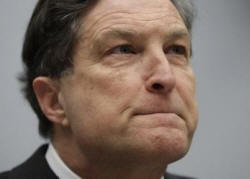|
 Fed's
Lacker says no shame in returning to zero after June
hike Fed's
Lacker says no shame in returning to zero after June
hike
 Send a link to a friend
Send a link to a friend
[April 11, 2015]
By Michael Flaherty
SARASOTA, Fla. (Reuters) - Federal Reserve
official Jeffrey Lacker on Friday repeated his call for the central bank
to consider hiking interest rates in June, and said there was no shame
in adjusting them lower again if economic data demanded it.
|
|
 "If we were to raise rates, and then subsequently reduce them to
zero, it might be unexpected, but presumably we’re setting rates
where we ought to be," Richmond Fed President Jeffrey Lacker said in
a question and answer session to reporters after a speech here. "I
don’t see it as problematic to reduce rates having raised them
once." "If we were to raise rates, and then subsequently reduce them to
zero, it might be unexpected, but presumably we’re setting rates
where we ought to be," Richmond Fed President Jeffrey Lacker said in
a question and answer session to reporters after a speech here. "I
don’t see it as problematic to reduce rates having raised them
once."
Lacker's speech was a repeat of the policy views he shared late last
month. But he offered more details into his stance in the questions
he fielded afterward, and also addressed the minutes of the March
policy-setting meeting, which were released on Wednesday.
The minutes said that "several participants" indicated they expected
upcoming economic data would warrant an initial rate increase in
June. Participants refer to Fed board officials and regional
presidents at the table, while the central bank's policy voters are
referred to as members.

When asked on Friday how many was "several," Lacker said there was
"a pretty substantial amount" of support for June at that point but
did not give an exact number. Lacker is one of the voting members on
the policy-setting committee.
Lacker's call for a June hike comes amid a weak patch in economic
data, including a dismal March jobs report, which was less than half
February's pace and the smallest gain since December 2013. It also
comes as the soaring dollar and falling oil prices have held back
inflation measures. But Lacker cited a plunge in the unemployment
rate and strong consumer spending as signs the Fed needed to move
ahead with its plans to hike.
[to top of second column] |

"I think there is good reason to believe that some of the recent
weakness in indicators as transitory," Lacker told reporters, citing
swings in the dollar and energy prices, plus bad weather as
impacting first-quarter economic data.
"I think we need to take a longer view. We need to look through that
in setting interest rate policy," Lacker said.
Lacker, who was speaking at a Global Interdependence Center event,
dismissed the notion of labor market slack and said the cyclical
effect of what drives a lower labor participation rate is "gone
now," said citing the retirement of baby boomers and other factors.
(Reporting by Michael Flaherty; Editing by Chizu Nomiyama and
Meredith Mazzilli)
[© 2015 Thomson Reuters. All rights
reserved.] Copyright 2015 Reuters. All rights reserved. This material may not be published,
broadcast, rewritten or redistributed.
 |